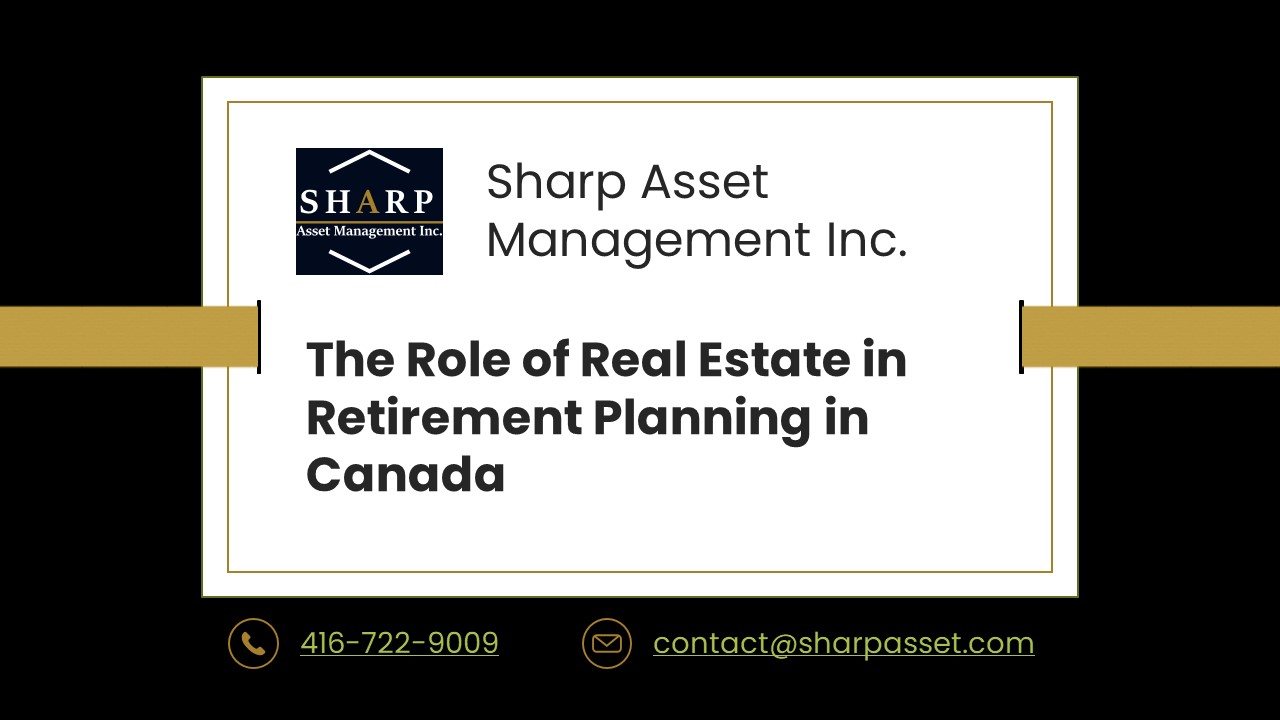Importance of Real Estate in Retirement Planning - PowerPoint PPT Presentation
Title:
Importance of Real Estate in Retirement Planning
Description:
Real Estate is important for a diversified portfolio. Besides the great tax breaks, Canadian real estate helps diversify and protect your retirement portfolio. – PowerPoint PPT presentation
Number of Views:1
Title: Importance of Real Estate in Retirement Planning
1
- Sharp Asset Management Inc.
- The Role of Real Estate in Retirement Planning in
Canada
- 416-722-9009
- contact_at_sharpasset.com
2
- Introduction
- Planning for retirement is essential to ensure
you have enough income to maintain your desired
lifestyle after you stop working. - A secure income stream is crucial for covering
your expenses in your golden years. - Real estate can be a valuable tool to consider
when crafting your retirement plan in Canada.
3
- How Can Real Estate Contribute to Your Retirement
Plan?
Benefit Description
Steady Income Stream Rental properties provide a consistent income source, supplementing pensions and CPP to uphold your preferred lifestyle.
Appreciation Potential Historical trends suggest Canadian property values may appreciate, offering a potential gain upon sale.
Inflation Hedge Real estate in Canada tends to keep pace with or surpass inflation, safeguarding your purchasing power.
4
- How Can Real Estate Contribute to Your Retirement
Plan?
Benefit Description
Tangible Asset Owning and controlling real property fosters a sense of security and stability.
Taxation Advantages Strategic tax strategies like Capital Cost Allowance (CCA) deductions and mortgage interest can offer benefits (consult a tax advisor).
Portfolio Diversification Real estate diversifies your investment portfolio, mitigating overall risk as it often operates independently of the stock market.
5
- Tax Advantages of Real Estate for Canadian
Retirement
- Principal Residence Exemption (PRE) Your
principal residence enjoys a capital gains
exemption (consult a tax advisor). This means
profits from selling your primary home are
generally not taxed. - Reduce Taxable Income For rental properties,
claim Capital Cost Allowance (CCA). Deduct a
portion of the building's cost from your rental
income over time, lowering your taxable income. - Downsize Save Selling your principal residence
for a smaller home can generate tax-free capital,
lower property taxes and maintenance costs, and
potentially free up cash for retirement.
6
- Considerations for Canadian Retirement Real
Estate Investment
Financial Considerations Upfront Costs Carefully factor in down payment, closing costs, potential renovations, and vacancy periods.
Financial Considerations Ongoing Costs Property taxes, maintenance, repairs, and potential management fees can erode profits.
Financial Considerations Cash Flow Analysis Ensure the property generates sufficient income to cover expenses and yield a profit.
7
- Considerations for Canadian Retirement Real
Estate Investment
Time Commitment Management Responsibilities Landlords dedicate time to tenant concerns, repairs, and property showings.
Time Commitment Liquidity Considerations Selling real estate takes time, limiting immediate access to cash.
8
- Considerations for Canadian Retirement Real
Estate Investment
Market Risks Market Fluctuations Be prepared for potential downturns that could impact property value.
Market Risks Interest Rate Sensitivity Rising interest rates can affect mortgage payments and profit margins.
9
- Contact us
- 21 Greenwin Village Rd. Toronto, Ontario M2R 2R9
- P.O BOX 74539 Humbertown Centre,
- 270 The Kingsway Toronto, ON M9A 5E2
- 416-722-9009
- contact_at_sharpasset.com
- www.sharpasset.com
10
- Thank you































